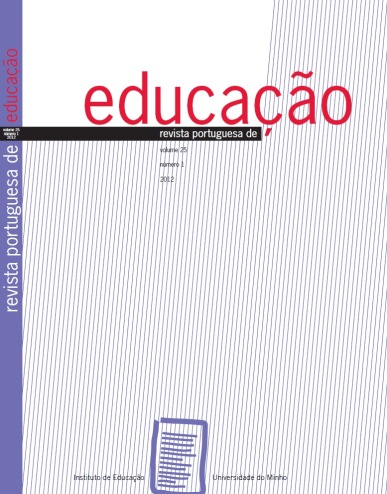MATURItY, ACADEMIC PERFORMANCE, REASONING ABILITY AND SOCIOECONOMIC STATUS IN 6 AND 13 YEARS OLD CHILDREN FROM LISBON
DOI:
https://doi.org/10.21814/rpe.3021Abstract
This essay intends to evaluate the association between maturity, academic performance (AP), reasoning ability (RA) and socio-economic status (SES) in a sample of 792 children (394 boys and 398 girls), with ages between 6 and 13 years old. Maturity was estimated through the bone age (Tanner et al., 2001) and the academic performance was obtained through inquiries to teachers, results of school tests and the levels achieved during the second term. The socio-economical status (SES) was estimated through the Graffar Scale (Graffar, 1958) and the reasoning ability (RA) by using the test of Raven’s Coloured Progressive Matrices (Raven, 1963). These data were handled with the program SPSS 17.0 (p≤.05). We verified that the AP was
directly related to the SES, that the boys’ RA was higher than the girls’, that there were no differences between the boys’ and the girls’ AP on different SES classes, that the boys who were more mature obtained higher academic results than those who were less mature, that maturity was associated to the AP, and that this association was, in general, dependent on the association between the SES and the AP.
Keywords
Maturity; Academic performance; Reasoning ability; Socio-economic status
Downloads
Downloads
How to Cite
Issue
Section
License
1. The authors preserve their authorship and grant the Portuguese Journal of Education the right to the first publication. The work is licensed under Creative Commons Attribution License that allows sharing the work with the acknowledgment of initial authorship and publication in this Journal.
2. The authors have the right to take additional contracts separately, for non-exclusive distribution of the published version of their work (e.g. to deposit in an institutional repository or as a book chapter), acknowledging the initial authorship and publication in this Journal.
3. The authors have the permission and are stimulated to post their work online (e.g. in an institutional repository or on their personal website). They can do this at any phase of the editorial process, as it may generate productive changes, as well as increase impact and article citation (see The Open Citation Project).
The work is licensed under Attribution-ShareAlike 4.0 International (CC BY-SA 4.0)




















